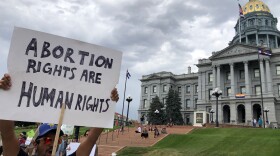The U.S. Supreme Court decision to overturn Roe v. Wade is reverberating throughout the country. To find out how this ruling could impact abortion services in Colorado, KUNC's Beau Baker spoke to Dr. Warren Hern, director of the Boulder Abortion Clinic. He's been providing access to care since 1975.
Interview Highlights:
These interview highlights have been lightly edited for length and clarity.
Beau Baker: How did this news this morning hit you?
Dr. Warren Hern: I think it's a horrifying decision. It is the first time in American history that a constitutional right has been revoked. All the other decisions have tended to expand rights for people. But this decision by this current court, which is extremely conservative and I would say medieval, takes away the status of women and their freedom to make decisions about their own bodies. So this decision hurdles women back several centuries and time, and it it makes women chattel. And it's a very dangerous situation.
Baker: Dr. Hern, what are we going to see from your view? What are we going to see in Colorado in terms of people seeking care now that this decision has come down?
Hern: Well, for one thing, it will accentuate a long-term trend of women coming to Colorado from other states to have abortions because they can't get them in their own home state. That's been going on for a long time. And I've been having patients come to my office for over 40 years from other parts of the country. That increased during the last year after the SBA, Texas law, which outlawed early abortion in Texas and now under in Oklahoma. So all of the states that were banned have made the trigger laws abolishing abortion upon this decision will now be places where women can no longer get safe abortions and they will travel to other states to do that. That's for women who have money.
There are plenty of women who don't have bus fare to get from one end of town to the other, much less to the mountainous next community or to the next state or to Colorado. So those women will either continue their pregnancies or they will suffer and die as a result of inability to get a safe abortion or a self-induced abortion, which can be very dangerous and fatal. So a lot of women will die as a result of this decision.
Baker: And how do states like Colorado that are trying to protect abortion access, how do we avoid being overwhelmed to the point that we're not able to accommodate the need for care?
Hern: Well, we're already overwhelmed. I mean, all of my colleagues and I have had an increase of of 50 to 100% in the number of women we're seeing. And it's it's impossible. You know, I can only see a limited number of patients because we have a highly specialized practice that helps women with very complicated pregnancies that are immediately life-threatening or where they have a catastrophic fetal abnormality. And so we're we're really seeing all the patients we can possibly see and we're we're scheduled two or three weeks out. And that's true for all my colleagues and other clinics that I know about.
Baker: And Dr. Hern, how do you see your role in this world, in this post Roe vs. Wade decision?
Hern:] Well, fortunately, we're in Colorado, which has been very pro-choice since Colorado was the first state in the country to legalized abortion in 1967. And Colorado has been pro-choice all the time, including under Republican governments. But it's always been a struggle to maintain this right.
But now the Colorado legislature has passed the Reproductive Health Equity Act, which was signed into law on April 4th by Gov. Jared Polis. So that really protects women unless the Republicans take over the state legislature. And so this my point would be that no woman's life and health should be at the risk and the mercy of the next election or her zip code.






